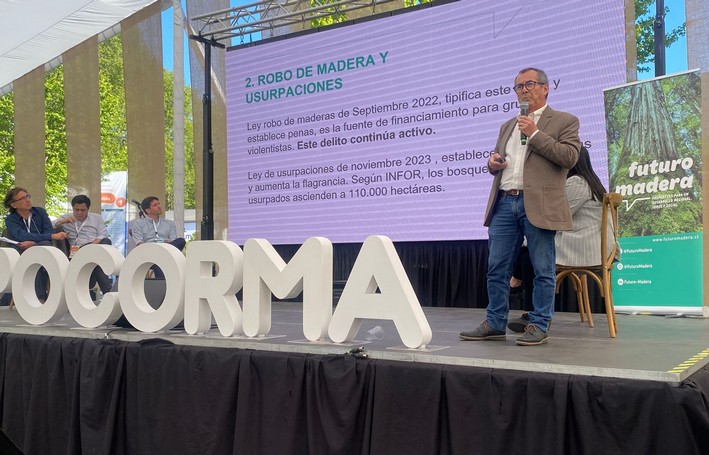A discussion in the context of Expocorma addressed the properties of wood as a construction material, sector safety, the gender gap, and the importance of collaboration among different stakeholders.
"Wood: A Meeting of Knowledge," led by the Futuro Madera network, was the title of the event held as part of Expocorma 2024, the most important forestry event in the world, organized by the Chilean Wood Corporation with over 160 exhibiting companies.
The network, which brings together organizations such as the Chilean Biomass Association (Achbiom), the Forest Contractors Association (Acoforag), the Native Forest Owners Association (Aprobosque), the College of Forestry Engineers of Chile (CIFAG), the Chilean Wood Corporation (Corma), and Small and Medium-Sized Wood Industries (Pymemad), invited Eugenio Sanfuentes, Dean of the Faculty of Forestry Sciences at the University of Concepción, to moderate the panel.
During the session, forestry engineer René Muñoz, manager of Acoforag, presented his talk on security in the southern macrozone and how workers experience violence, unable to operate freely.
He stated, "From the network, we believe it is essential that these issues do not disappear from the map. We know there are areas where we have made progress, but risks remain regarding violence, preventing intentional fires, and, of course, the severe economic situation of SMEs in the sector."
Meanwhile, academic Frane Zilic opened the panel by discussing the importance of construction and wood use to achieve environmental goals and strengthen the sector. In turn, Paula Valencia, coordinator of Corma's Más Mujer program, shared some figures on gender representation in the industry and provided recommendations for companies to encourage female participation and reduce the gender gap. Finally, Miguel Jofré, part of Futuro Madera's coordination team, emphasized the importance of building joint dialogue processes among different stakeholders to achieve common goals.
The panel, held during the 22nd edition of Expocorma, concluded with a series of audience questions that delved into the importance of involving various stakeholders—such as academia, communities, the government, and businesses—in fostering a culture that values wood as a unique, renewable material that contributes to climate action.







Comentarios (0)
No hay comentarios aún. ¡Sé el primero en comentar!
Deja un comentario